Montana Ghost Towns
The story behind Montana Ghost Towns is much the same as in other parts of the west, mining boom followed by mining bust so everyone moved away leaving behind their houses and some of their possessions. The two that we highlight on this page fit this profile, but there is a significant difference between them. One is deserted and we could hear it crumbling into the ground as we explored it, but the other has new life appearing amongst its old buildings.
Interior of abandoned building, Comet
The interiors of the buildings bring home the advanced state of decay. The blue and green decor of the last occupants is still visible in this building, but with gaping holes in the roof it is only a matter of time before this building collapses. Elsewhere we found old stoves and even the remains of various items of furniture.
Abandoned building, Comet, MT, USA
Comet still has a population, albeit of only three people. The single modern house sticks out like a sore thumb amongst the old buildings. Unlike Bodie in California which is preserved in a state of ‘arrested decay’, Comet was audibly decaying as we walked round it. We heard buildings creaking in the wind and we paused a couple of times after hearing sounds of falling debris. Comet is easy to visit as it is only 6 kilometres (4 miles) along an unsurfaced (unpaved) road from Interstate 15, but if you decide to visit do so soon and treat the buildings and their contents with respect, they are in a fragile state and they are still private property.
Gillian Hall & Fraternity Hall, Elkhorn
Gold was first discovered at Elkhorn in 1870 by Swiss immigrant Peter Wyes. He died soon after but the claim was developed by the Elkhorn Mining Company who built a mine and mill. The mine boomed through the late 19th century producing some $14,000,000 in silver. Transportation to and from the town was difficult until 1889 when the Northern Pacific Railroad ran a spur to Elkhorn enabling supplies to be brought in and silver ore to be taken to East Helena for processing. The Elkhorn mine shut down in 1899, but other mining activities continued sporadically until the 1970s. While most of the town remains private property, two properties are in public ownership and preserved as a State Park. Gillian Hall, on the left, was built in the 1880s and in its time served as a store, saloon and dance hall. Fraternity Hall built in the 1890’s was used to stage shows.
Comet Mill, Comet
Comet has been through more then one boom and bust. The mines here reputedly produced more than $13 million in gold and silver as well as base metals. Its population had grown to 300 by 1875, and in 1877 a post office was opened. While the silver crisis of 1893 heralded the end for many of Montana's smaller mining camps, Comet remained profitable into the 20th century. Yet, by 1913 the town was largely abandoned. The mines revived during the Depression, and some mining and milling continued until 1941. Since the mill shown in this picture has been abandoned and the town facing it slowly disintegrating. Click Tab 2 to see the rusting remains of a car abandoned at Comet.
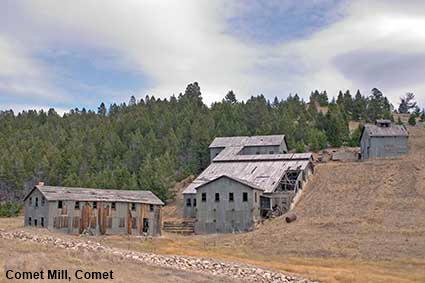
Click on Minimap to navigate
DLU061115
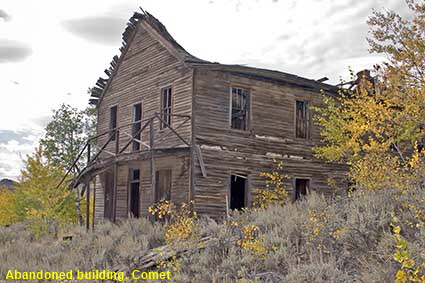
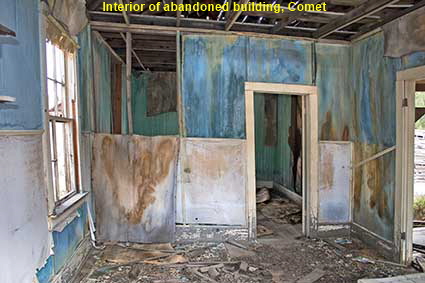
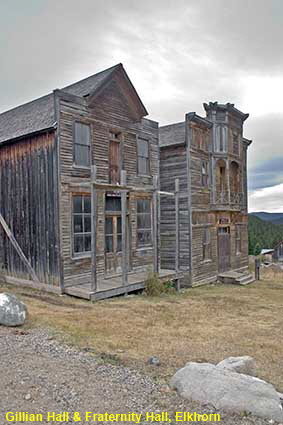
Collapsing building, Elkhorn
The classic Ghost Town picture - and old wooden building leaning at a crazy angle. But for the adjacent building still having enough strength to take the weight, this would be a heap of broken timbers. Interspersed amongst the decaying buildings and the two preserved buildings are modern homes. Elkhorn was never completely abandoned, which helped to preserve it. However, the smart well-maintained modern homes with 4x4s parked outside suggest that Elkhorn is now coming back to life.
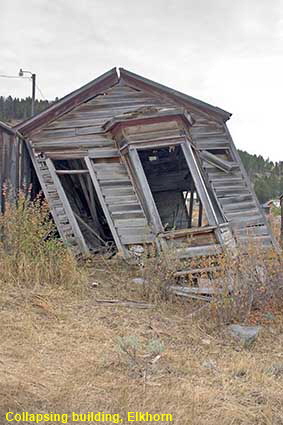
Elkhorn from trail to cemetery, MT, USA
Elkhorn Cemetery is about 1.6 kilometres (1 mile) from the town but the trail up to it is fairly steep. Those with sense will drive there, but we chose to walk. For our trouble we were rewarded with this view across Elkhorn. Fraternity Hall is visible in the centre of the picture with Gillian Hall hidden behind it, and modern houses can be seen dotted around the town. It is worth the effort to go to the cemetery as the gravestones tell you a lot about life and death in the boom years, particularly reminding you about just how high death rate was for children. Click Tab 2 for a picture of Elkhorn Cemetery.
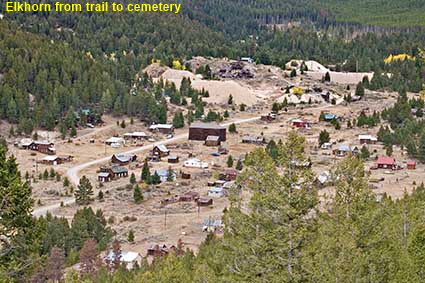


To move forwards or backwards through the Montana trail click the arrows above, or select your next destination on the Minimap.


© Mike Elsden 1981 - 2025
The contents of this page may not be reproduced in full or in part without permission